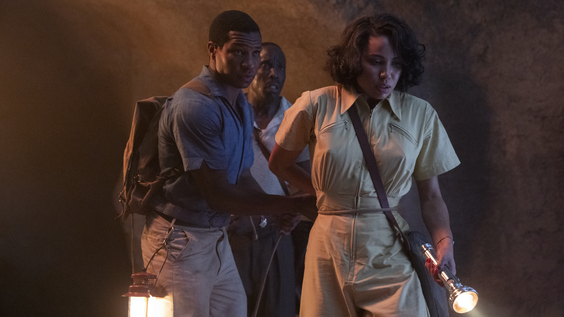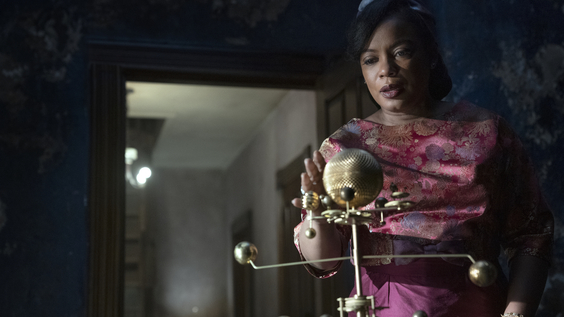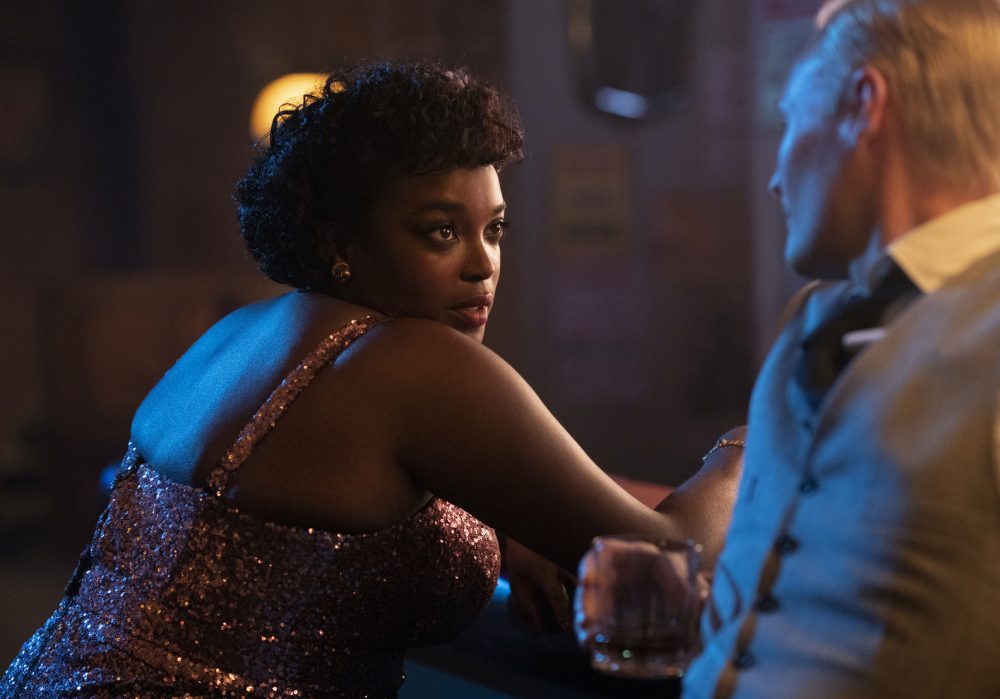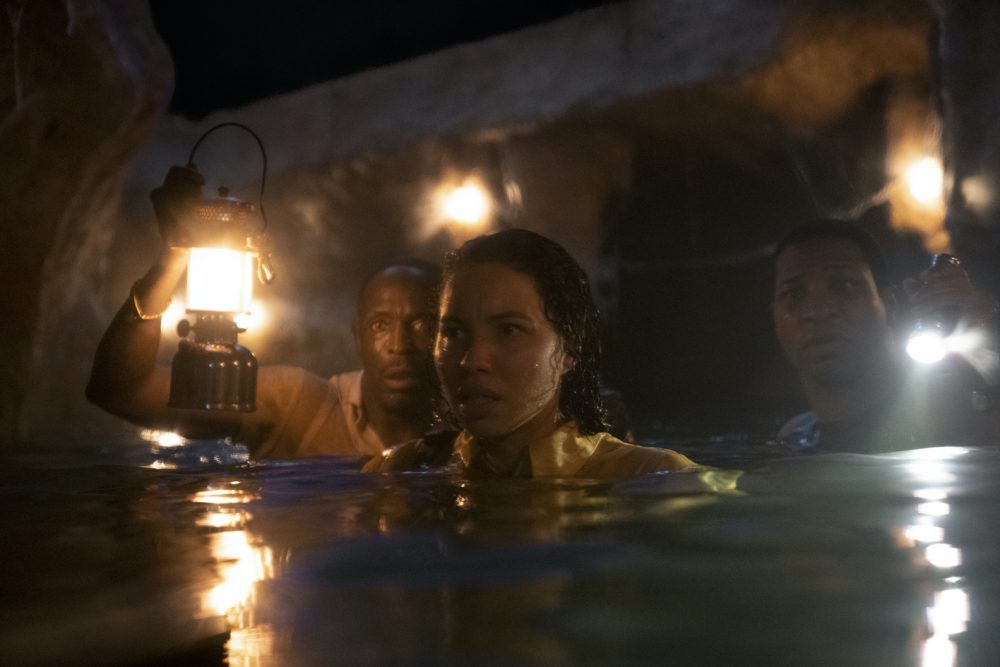Sitting in the dark, Montrose listens to a radio telecast warning citizens to be wary and prepare to “defeat the reds” by destroying their supplies. It’s the time of The Red Peril aka McCarthyism. A time in American history — during the Cold War which occurred following WWll — when propaganda against communist ideologies was promoted. He’s agitated, unable to keep still. Memories of events in his life bombard him. After reciting a passage from the by-laws of The Order of The Ancient Dawn, the sacred book belonging to The Sons of Adam, he sets it on fire, saying, “It smells like Tulsa.”
On the sun-dappled streets in North Side Chicago, Christina rolls up in her Rolls Royce to the formerly haunted house now belonging to Leti. Expecting to just stroll on in, she steps over a painted sign directing Black people towards the entrance but is denied entry when the blood ward painted on the doorpost stops her. I may have chuckled at this; the fact that she was denied entry is proof of how evil she actually is.
Leti figures out rather quickly that she’s the one who provided the money for the inheritance, but that matters not. She finally leaves after Leti tells her the orrery she’s looking for, that belonged to Hiram Epstein, isn’t there. Hippolyta has it. In “Holy Ghost” we saw the door to the room where the orrery was being kept, magically open, and Hippolyta appearing to be drawn to it, entered the room. Could this be a hint that Hippolyta has supernatural abilities? Perhaps. After all, she is named after the queen of the Amazons, and as we’ve learned so far, everything in Lovecraft Country has meaning to the overall plot.
Angry over finding out about Tic’s weak attempt at confronting and killing Christina, Leti goes to Tic at the library where he reveals his plans to find a vault created and hidden by Titus Braithwaite. It may be where the last two remaining pages from the Lost Book of Names may be, which is why Christina wanted the orrery. He believes that if they can decipher the Language of Adam, they may have the key to defeating Christina.
After Leti convinces him that his father may have information about the vault, Tic goes to Montrose with great reluctance. Montrose makes no bones about how foolhardy he believes Tic is being in his quest to find out about the Braithwaites and going after Christina. But when Leti admonishes him for holding back information, he begrudgingly tells her the answers they seek are in Boston. Tic and his father are both super stubborn, and their resentment is going to cause problems later on down the road if they don’t sort their issues out.
Tensions are high between Leti, Tic, and Montrose as they prepare for their road trip to Boston with Hippolyta and Diana coming along for the ride. Someone else joins them, but he doesn’t matter. I don’t know why he was even there.
While her sister and the others head out on the road, Ruby enters what she considers the hallowed halls of Marshall’s Department Store, and to her chagrin finds a young Black woman working. She asks the young lady if she recently began working there, which is confirmed with a bright smile and the added bit of info that she got the job after applying on a whim, which Ruby very obviously doesn’t appreciate.
We know this burns Ruby for multiple reasons, as it confirms one of her fears. Not only has she been repeatedly rejected because of her race, but also her size. Ruby is plus-size. This young perky store clerk is not. She slim, shorter, and younger, more *feminine. Yes, she’s Black, but she also meets the requirements of “desirability” in women, set out by society. Her presence is more proof that Black women are judged not only for our race, but our sizes, and it’s a bitter pill for Ruby to swallow.
Finally in Boston, our treasure hunters arrive at the museum where Titus has an entire wing dedicated to his colonizing voyages around the world. While Tic and Leti go in search of clues, Hippolyta and Diana gaze at the stars in the astronomy auditorium. Hippolyta points out Hera’s Chariot, the comet she named as a child, but was never given official credit for because the astrological society that held the competition she had entered, refused to give it to her. Not wanting “a little colored girl” to be the winner, they gave credit to a Swedish girl instead. Feeling proud of her mother, and wanting others to know the truth, Diana loudly proclaims that her mother named the comet, eliciting excited gasps from the other children. As with Ruby, Hippolyta has had many situations in her life where people refused to acknowledge her simply because of her race. It’s an important moment for both mother and daughter because Diana got to learn more about her mother’s past, and Hippolyta finally has a moment where her achievement can be publicly acknowledged.
In the Braithwaite wing, Leti, Tic, and Montrose walk through an exhibition of artifacts stolen from indigenous Caribbeans and Native Americans. There Tic finds a clue leading them to the vault inscribed on the base of a bronze statue of Titus (of course), which they return to later that night. By the light of the moon, this episode changes from a drama to a mystery adventure, giving us a genre entertainment like Night at The Museum, the Indiana Jones films, and the Goosebumps series. Under the statue, they find four tunnels representative of the four voyages Titus took to the Caribbean.
Leti figures out they should take the one heading North because it was built after Titus’s last journey. She’s a smart cookie that one.
Pissed off about the unfairness of the world, Ruby cusses out the patrons of the pub she’s singing in and heads to the bar. Not even two minutes later, who else but William should approach her, not so subtly offering to fulfill whatever desires she has, and I roll my eyes. There’s nothing new about what he says, and we know he’s up to no damn good. Having no other options Ruby accepts, and they go back to his place to make steamy love on the stairs.
Under the museum, our trio finds a bottomless cavern with a rotting plank of wood stretching across it leading to the other side. Surviving the first of a few boobytraps, make it across to the other side, finding more tunnels, this time filled with rising water levels. Tic and Montrose once again get into an argument when Montrose makes a comment about Tic learning to leave soldiers behind from the imperialist organization he fought for. And he’s right. America is an imperialist nation that routinely sent soldiers to fight in foreign wars, but that’s another story for another day. Tic in-turn challenges his father about the secrets he keeps. He questions how Montrose knows so much about the Braithwhites and the clues to the vault. Feeling pressured, Montrose reveals he read them in the Ancient Dawn By-laws before destroying it. Of course, this understandably angers Tic, but before things escalate, Leti screams. There’s a body floating in the water. It’s one of the men who died in her house during the exorcism.
Following the direction the body came from, they find an entrance to the elevator in her house, and it’s working…in a flooded mysterious deathtrap of a tunnel. It seems Hiram created portals that allowed him to get up to all kinds of horrible shenanigans. Leti finds the vault with Hiram’s arm trapped in the locking mechanism (EWW). With no other choice, Tic puts his arm in and it opens after extracting blood. As revealed in episode two, his ancestry is literally the key to unlocking the secrets of the Braithwhites, and if I’m right, defeating Christina herself.
On the inside they find a room, a ship’s cabin to be more precise, filled with decaying books and the skeletal remains of people wearing traditional indigenous dress, one sits at a desk covered in paper. As Tic draws closer, it begins to move and reanimate. Destroyed flesh becomes whole again. They begin speaking in an ancient language that Tic instinctively understands. It’s the Language of Adam. When asked who the person is, they reply that their name is Yahima Maraocoti (Monique Candelaria). “Woman. Man. Two-spirit.” They are from the “Land of Many Waters”. They are from a Caribbean Arawak tribe. I’ll admit, I at first thought Yahima was Native American because I thought the phrase “Land of Many Waters” was a reference to the many lakes of North America, but in researching, it’s also what the word Guyana means, and then I remembered that I learned this in secondary school in Barbados.
Yahima begins to tell the history of how Titus came to their land seeking someone to translate his book filled with symbols Yahima recognized from Alomun Kundi, a cave known to their people. Thinking Titus meant no harm, they began translating the ancient text. But he was a deceiver. Yahima says that he and the others like him were always hungry, wanting more and more from the people and land. When they finally saw him for who and what he really was, they refused to decipher the ancient scripts he wanted translated. In retaliation, he killed their people and imprisoned Yahima in his ship’s cabin with the bodies of their loved ones. Seeing something in Tic, Yahima tells him that he’s not guilty of his forefathers’ actions, but they can’t help him because they don’t know his spirit.
When Montrose takes the pages from her hands, water floods the room, and they rush to the elevator, where Yahima lets out a piercing scream before Tic knocks them out.
Safely back in Chicago, Tic informs Montrose that Titus turned Yahima into a Siren to prevent them from sharing what they knew outside of the cabin. Montrose, in a rare moment of positivity, tells Tic that his mother would’ve been proud of his bravery. After Tic bids him goodnight, Montrose enters the room where Yahima sits, says, “I’m sorry” and slits their throat. I legitimately hate that this happened.
To me, this turned what was a great moment of representation for people from a marginalized community, into one of tragedy and pain. To have a character like Yahima, in a primetime cable show was a truly momentous occasion. It became a betrayal for the audience, the character, and the story. I also think it was a huge miscalculation on the creative team’s part.
As the episode title — “A History of Violence” — points out Yahima’s story was to show America’s history of violence on People of Color. The purpose was to discuss the horrendous acts men like Titus perpetrated against the indigenous tribes of the Caribbean, South America, and the whole world. Colonizers like Titus committed racial genocides, robbing the world of entire cultures and their histories — some to be never known. For Montrose, a Black man, soullessly killing Yahima, to silence them the same way that Titus did, was wrong and goes against everything that Lovecraft Country is supposed to be about.
If Yahima had to go for the story to progress, another way should’ve been found, though I personally don’t think it needed to happen at all. We turn to shows like Lovecraft Country because we want to escape the pain of the reality where people from the LGBTQ+ and other marginalized communities are abused and murdered. Knowing that Yahima is an indigenous person of the Arawak tribe, hits close to home for me because I’m Barbadian by birth. Barbados is one of the islands in the Caribbean that was inhabited by Arawaks before the Spanish came and wiped them out. I’m also of Guyanese heritage through my maternal Grandfather, which is where Yahima is from, and whose people it’s said earlier in the show Titus raided for everything he could find. (It’s also worth noting that Barbadian singer and entrepreneur Rihanna whose song “Bitch Better Have My Money” was used in the show, is also of Guyanese descent.)
To see a character representative of a people who no longer exist, a people from the land where I’m from, that I’ve never seen represented on TV, killed this way, hurts. To see Yahima robbed of their chance at living a new life when in the previous episode we saw the souls Black people who had been tortured and murdered get justice, even if it had to be from beyond the grave, is disheartening and very disappointing. For what good does it do to show People of Color killing each other when the common enemy continues to thrive? We deserve to win. If we can’t in life, at least give it to us in fiction.
Montrose Freeman is a man tormented and haunted by his past. He’s an enigma. As it stands we still don’t know much about him. All we know is that he suffered abuse at the hands of his father, had an estranged relationship with George, Tic, and his mother. We also got another hint that his troubled personality is tied to the events of the Tulsa Massacre. Perhaps he lived there after leaving his family home. But despite what we learn, I’m not sure if it will make audiences look upon him differently and in a better light. I don’t care if he thinks he’s protecting Tic from the evils of the Braithwaite family, he gets no grace from me after what he did to Yahima. Killing innocent people can never be justified.











